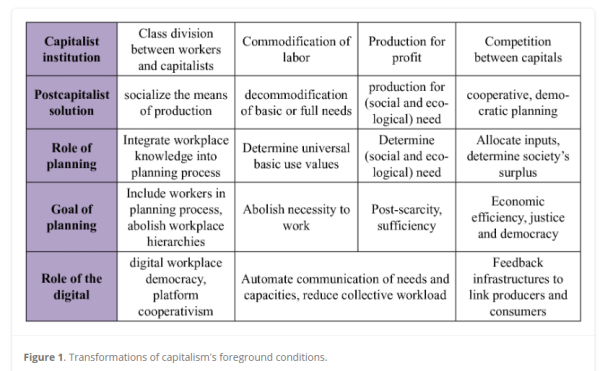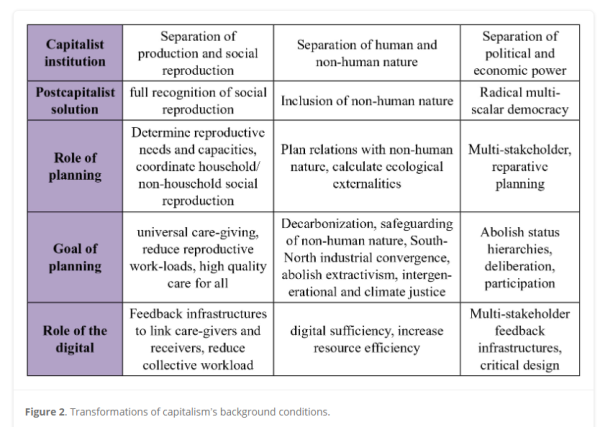Category:Post-Capitalism
What comes after capitalism, and how do we get there ?
A post-capitalist society can only be a Resource Balanced Economy. [1]
Contextual Quote
"My point is that the idea that we live in capitalism, that politics is everything, is a lie and a misapprehension that suits capitalism and the power hungry.
In reality, we live most of our lives in a sea of humanity, through conversations mediated by pre-capitalist cultures and conveyed by a post-capitalist technosphere.
In short, we already ignore both capitalism and politics most of the time."
- Dil Green [2]
Key Articles
- Criteria for a Post-Transitional Economic System. By Daniel Schmachtenberger.
Key Books
- Four Futures. Life After Capitalism. Peter Frase. Jacobin, 2016 [3]
"In science fiction, alternatives to market economies abound ... and it is through these tales that sociologist Peter Frase asks us to think through four different ways things could go." (Cory Doctorow)
Frase's Four Futures are:
1. Communism ("equality and abundance")
2. Rentism ("hierarchy and abundance")
3. Socialism ("equality and scarcity")
4. Exterminism ("hierarchy and scarcity")
- Nick Gallent, Menelaos Gkatzios, et al. Postcapitalist Countrysides – From commoning to community wealth building. UCL Press, 2025
Key Quotes
Daniel Gortz on the Competitivity of the Commons within Capitalism
Daniel Gortz:
"The economic logic of capitalism is now shifting due primarily to the advent of the Internet; as such, it becomes more profitable for societies at the aggregate level to not enclose information, and to invest in the happiness, inner growth, perspective-taking, and mutual trust among citizens (as well as other markers of the quality of relationships), as this drives the solution of complex problems, which is the great scarcity of our time. Volumes of goods are not the main scarcity; complexity management is. This creates an impetus to develop economic systems such as the commons, to the extent that these can attract greater investments and resolve more complex issues. This all flows from the plain fact that creativity cannot readily be bought: it emerges through relations, play, and inspiration by ideas and purpose. And creativity drives value creation more than anything else in a world that is already postindustrial to a significant extent.
In other words, to the extent that we can engender postcapitalist institutions that attract more capital because they genuinely offer more of what people want in the long run, and these can reinvest a larger part of the capital than capitalist companies do (because they are loyal to stakeholders rather than investors), this leads to an accumulation cycle in which postcapitalist institutions can begin to supplant capitalist ones.
The key issue here is "by which logic is human agency coordinated over time and space?" -- and the irony is that, under the current technological circumstances, the aggregate profit is higher when people are coordinated by non-monetary means, which in turn allows for more efficient reinvestments of that same profit." (https://wiki.p2pfoundation.net/Daniel_Gortz_on_the_Theory_of_Moral_Revolutions_as_Rooted_in_Socio-Economic_Transformations)
Dil Green on Establishing a Bridge Between Capitalism and Post-Capitalism
Dil Green:
"The idea of the Bridge is inspired by a section in Yanis Varoufakis’ “Talking to my Daughter about the Economy”, in which he talks about the birth of capitalism through the lens of the wool trade in England. Feudal landlords had the assets – the land, the serfs and beasts that lived on the land. And they acquired and held them by deploying power; land was not for sale, and neither was labour. Wool merchants, though, convinced landowners to throw the serfs off the land and to rent it in exchange for gold so that the merchants could grow wool and sell it for even more gold.
The lords thus gave over control of the key asset of the feudal economy – land – in exchange for the key asset of the new economy – gold. In order to realise the value of that gold, though, they had to spend it into that same new economy. The feudal lords both funded the development of market economies by providing land, and then helped to expand their scope by spending investment returns into those same market economies. Thus over time the new asset – gold, became more desirable than the old – land, because it was useful in many more ways, until eventually land itself became a saleable asset – enabling it to be allocated to more productive uses through peaceful trade rather than violent struggle.
We can now see how we can use the two planks above to build an equivalent bridge from the current, extractive economy into the new, collaborative economy.
If we raise investment in pounds and dollars, which we use to build the new economy – most obviously, to finance the development of new, collaborative enterprises – and pay fair returns on those ‘fiat currency’ investments in the currency of the new economy – in UCO and MCU – then in order to access the value of those returns the investors will have to become participants in the New Economy.
Again, as with the transition from feudalism to capitalism, this will be a welcome move for many – the simple fact of being wealthy does not mean that an individual does not care about the damaging impact of an extractive economy on the biosphere. " (https://digital-anthropology.me/2020/10/17/two-planks-and-a-bridge-to-the-new-economy/)
Yves Citton on the Three Aspects of Post-Capitalist Strategies
"First, post-capitalism will not have to be invented from scratch out of nothing. There are already practices, solidarities, post-capitalist relations that have been set up both locally (AMAP - Association for the Maintenance of Peasant Farming -, ZAD, neighborhood associations) and globally (sensitivities and legislations).
Second, post-capitalism is not about breaking up a system that has passed into a future system. The story to be considered is one of a superposition of strata, rather than as a succession of states. Capitalism will remain present as a stratum on which another stratum will unfold, some lineaments of which have already been in place for decades or centuries.
Finally, it is perhaps in the most "advanced" developments of capitalism that one has to find the keys to what will be built on it, and partly against it." (translated from [5])
Tables
Via Christoph Sorg:
Transformation of Capitalism's Foreground Conditions

Transformation of Capitalism's Background Conditions

Pages in category "Post-Capitalism"
The following 89 pages are in this category, out of 89 total.
A
- After Capitalism
- Akseli Virtanen on Designing Post-Capitalism with the Economic Space Agency
- Akseli Virtanen on the Economic Grammar for Post-Capitalism
- Alnoor Ladha on Post-Capitalist Philanthropy
- Amanda Cahill on Post-Capitalism in the Here and Now
- Anarchism and the Promise of a Post-Capitalist Collaborative Commons
C
- Capped Returns
- Centre for Postcapitalist Civilisation
- Centre for Postdigital Cultures
- Collaborative Finance
- Commons Boundaries and Postcapitalism
- Community Economies Research Network
- Consciousness for the Post-Capitalist Commons
- Continuous Clearing
- Convergence for Post Capitalist Transition
- Convergence on Post Capitalist Transition
- Criteria for a Post-Transitional Economic System
- Culture, Carnival and Capital in the Aftermath of the Market Economy
D
E
F
- Foretelling the End of Capitalism
- Four Futures for Life After Capitalism
- Four Post-Capitalist Scenarios Inspired by Shrii Sarkar’s Cyclical Theory of Change
- From Capital To Commons
- From Capital to Commons
- From Hunter and Gatherers to Global Capitalism and Thereafter
- Fundamental Principles of Communist Production and Distribution
I
J
M
P
- Path To Living Economies
- Paul Cockshott on the Possibilities for a New Cybernetic Socialism
- Paul Mason on the End of Capitalism
- Politics of Growth and Post-Capitalist Futures
- Politics of Postcapitalism
- Post-Capitalism
- Post-Capitalist Commons
- Post-Capitalist Ecomodernism
- Post-Capitalist Futures
- Post-Capitalist Philanthropy
- Post-Capitalist Planning
- Post-Capitalist Transition Strategy Proposals by Yanis Varoufakis
- Post-Ownership, Post-Bureaucratic, or Post-Market
- PostCapitalism
- Postcapitalist Countrysides
- Postcapitalist Planning and Urban Revolution
- Postcapitalist Politics
- Protocols for Peer to Peer Value Creation
R
T
- Ten Commandments of a Post-Consumerist Alternative
- Thinking About Commons as a Post-Capitalist Perspective for Social Work
- Total Urban Mobilisation and the Post-Capitalist City
- Towards Post-Capitalism
- Transferring Assets to the Ethical Economy
- Transitioning from Extractive Capital Models to Generative Capital Models
V
Media in category "Post-Capitalism"
This category contains only the following file.
-
Bitcoin 2.0 KOR.pdf ; 780 KB